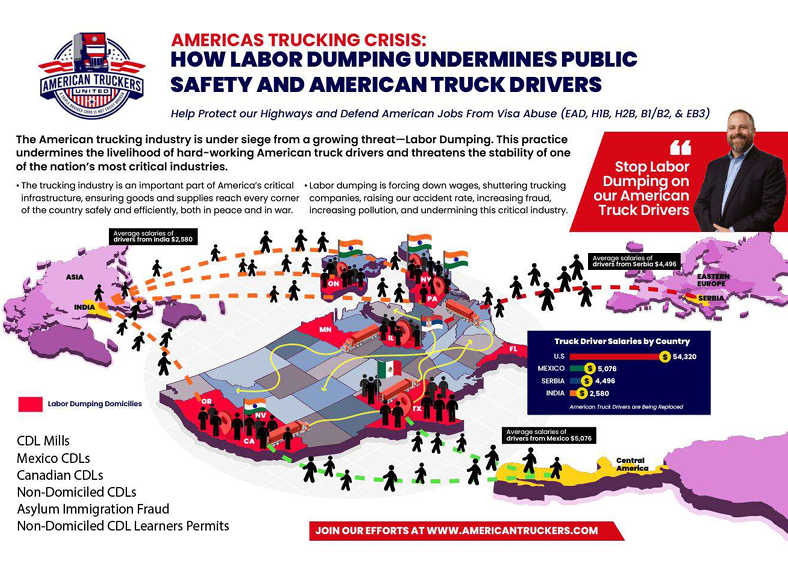Labor Dumping
Labor Dumping
A Threat to the Livelihood of All American Truck Drivers

Define Labor Dumping – Labor dumping occurs when an employer leverages immigration in order to pay employees less than the market rate or offers less favorable working conditions. This can happen for a number of reasons including: Taking Advantage of Open Borders and/or Offering lower pay based on the employee’s nationality or place of residence.
The situation in the U.S. trucking industry bears a striking resemblance to the issues faced with steel dumping, where foreign producers export steel to another country at prices lower than the production costs or lower than the prices in their home market.

- Unfair Economic Advantage: Just as steel dumping involves flooding the market with cheap steel, labor dumping in trucking involves flooding the labor market with drivers who are paid less, often due to different economic standards or regulations in their home countries. Both practices undercut local industries by providing an unnaturally low-cost alternative that domestic companies cannot fairly compete against.
- Distortion of Market Prices: Steel dumping leads to a distortion in steel prices, making it impossible for local steel producers to compete. Similarly, labor dumping distorts the labor market in trucking, where American drivers are pushed out because they cannot sustain themselves on the wages that match those of foreign drivers undercutting the market.
- Impact on Local Industry: The steel industry suffers from layoffs, reduced production, or even closure of plants due to dumping. In trucking, American drivers face job losses, wage suppression, and are driven out of the industry, which can lead to an extinction-level event for local truck drivers, akin to how local steel mills might shut down. They just cannot compete.
- National Security Concerns: Just as a reliance on foreign steel can be a national security issue, particularly in times of conflict or when supply chains are disrupted, the reliance on foreign truck drivers who might not have the same level of investment or loyalty to the U.S. can compromise the logistics network’s reliability and security. This is especially critical in scenarios requiring swift and dependable domestic logistics.
- Regulatory and Safety Implications: With steel, dumping can lead to substandard materials entering the market if not properly regulated. In trucking, the analogy holds with drivers who might not meet the same rigorous safety, training, or licensing standards as required for U.S. drivers, leading to potential increases in road accidents and fatalities, much like the substandard steel might lead to structural failures in construction or manufacturing.
- Legal and Enforcement Challenges: Addressing steel dumping involves complex trade laws, tariffs, and international negotiations. Similarly, tackling wage dumping involves immigration laws, labor regulations, and the enforcement of driver qualifications, which can be legally complex, especially when dealing with non-citizens.
Both phenomena illustrate how global economic practices can have deeply local impacts, necessitating protective measures not just for the sake of economic fairness but for public safety, national security, and the preservation of critical industries. The response to labor dumping, like steel dumping, will require regulatory intervention, stricter enforcement of existing laws, and potentially, new legislation aimed at leveling the playing field while ensuring safety and security standards are upheld.
THIS IS NOT A FREIGHT CYCLE – WE ARE IN A REPLACEMENT CYCLE
